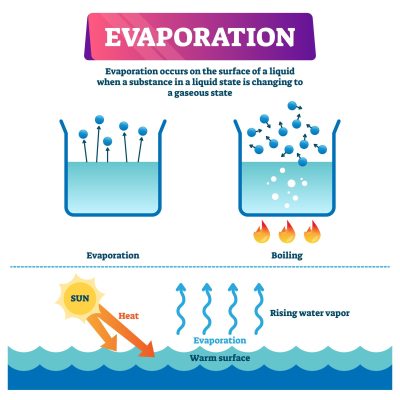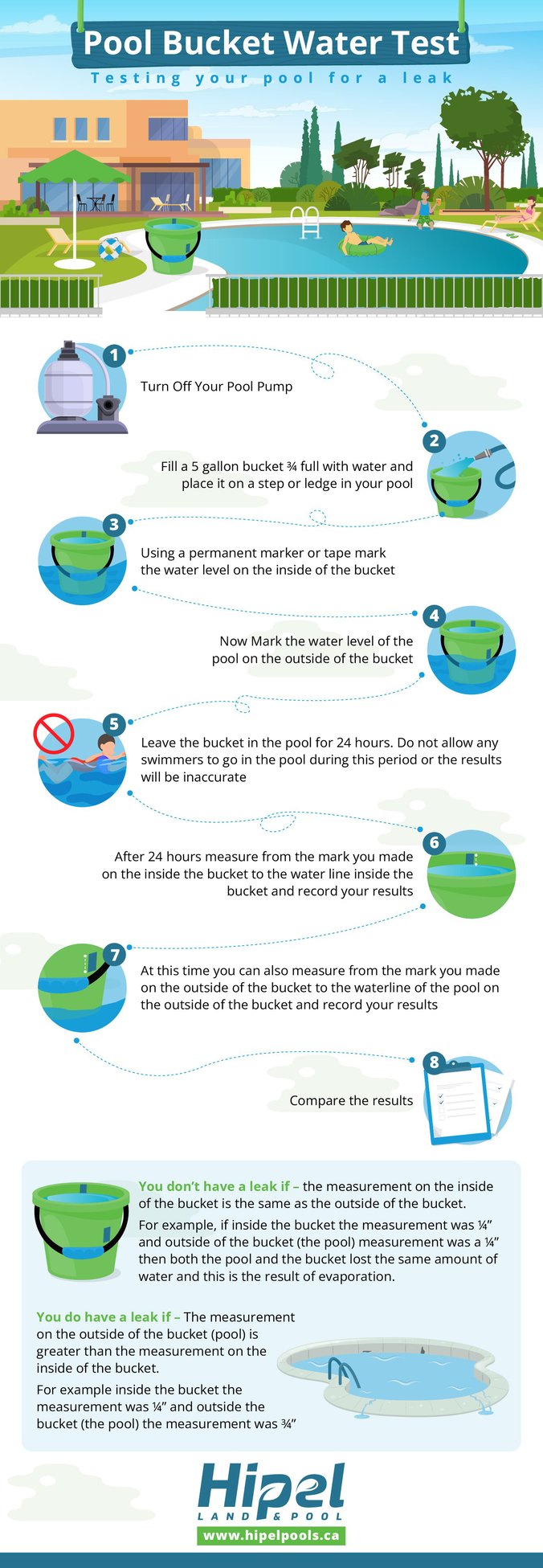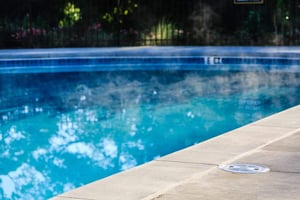An outdoor swimming pool typically loses around 1/4″ of water daily to evaporation, amounting to nearly 2″ of water loss a week. How much water you lose to evaporation depends on several environmental factors, such as; how much sun or shade your pool gets, humidity, wind, and temperature surrounding your pool, as well as the surface area of your pool.
If you are concerned your pool may have a leak, we will also discuss a simple “bucket test” that you can easily do to find out if your pool has a leak or is simply losing water to evaporation.
In this article, we will cover the following topics.
- What is swimming pool evaporation, and why does it happen?
- How to stop pool water from evaporating?
- Bucket Test – How to test if your pool is leaking or evaporating.
What Is Swimming Pool Evaporation, And Why Does It Happen?
We all have a basic understanding of water evaporation and why it happens. Still, very few people realize how evaporation can affect their swimming pool until they have to top up their pool with water every week. Often making pool owners think their pool leaks.
Evaporation is a type of vaporization that occurs on the surface of a liquid as it changes from a liquid into a gas. Evaporation occurs when heat causes water to transform into a vapour. A simple example of this is boiling water in a pot on the stove. In the case of your swimming pool, however, evaporation results from ambient heat caused by the sun beating down on the surface of your pool. Evaporation is an often invisible, unnoticeable occurrence.

What Causes A Pool To Evaporate?
Several factors contribute to a swimming pool’s water evaporating. Your pool’s water will evaporate at different rates depending on how these specific factors influence your swimming pool.
Exposure To Sunlight
Having a pool exposed to copious amounts of sunlight will substantially affect how much water evaporates from your swimming pool. Pools that are protected from direct sunlight by trees, fences, buildings and other objects will lose less water daily.
Temperature
Earlier in this article, we mentioned that evaporation occurs when heat causes a liquid to transform into a vapour. So obviously, on those blistering hot, warm summer days, you will likely lose a good amount of water to evaporation. Hot days and cool nights are the perfect recipes for evaporation to occur in your swimming pool. This will become evident if you’ve ever kept your pool heated late into the season and can watch the steam coming off the pool’s surface early in the morning. That steam is water evaporating before your eyes.
Low Humidity
Humidity also plays a major part in pool water evaporation. A good example of how humidity affects evaporation is comparing it to a sponge. Low humidity is like a dry sponge; it can absorb A LOT of water, whereas high humidity is like a wet sponge it can still absorb some moisture but not near as much as the dry sponge. If you live in an area with a “dry heat,” like Nevada, you will experience higher evaporation rates than an area with high humidity.
Wind
Wind affects evaporation by blowing away the water vapour (Humidity) above the surface of your pool. When this happens, it lowers the humidity of the air directly above the swimming pool. If we refer back to our example with the sponge effectively, the wind is drying out the sponge, allowing for more water to be absorbed, leading to higher evaporation rates. Remember, the lower the humidity, the more water can evaporate from your swimming pool.
Pools Surface Area
Your pool’s surface area is yet another factor affecting evaporation but is a rather simple concept to understand. The more spread out a body of water is, the more susceptible it is to evaporation because the water particles have more exposure to all the environmental factors we have listed above.
How To Stop Pool Water From Evaporating?
Now that we know what causes the water of a pool to evaporate, we can explore how to prevent as much evaporation as possible.
Liquid Pool Cover
A liquid pool cover is the fastest and most cost-effective solution to prevent evaporation in your swimming pool. A liquid pool cover is an alcohol-based pool chemical that, when combined with the water in your pool, forms an incredibly thin one-molecule thick layer on the surface of the water that is invisible to the naked eye, odourless, and impossible to feel. This ultra-thin layer on the surface of your pool is enough to help prevent evaporation and heat loss, which helps conserve water and save energy.
Solar Pool Blanket
A solar pool blanket is another fast and cost-effective way to help prevent pool evaporation. A solar pool blanket is a large plastic sheet similar to bubble wrap, creating a barrier between your pool’s surface and the air above. A study conducted in January 2016 by Cal Poly Researchers at the National Pool Industry Research Center found that solar pool blankets are about 95% effective at reducing evaporation in swimming pools.
Automatic Pool Cover
An automatic swimming pool cover isn’t viable if you have an existing pool. But, if you are considering doing a pool renovation or installing a new pool, you might want to consider one. Although far from the most cost-effective option, an automatic pool cover takes all the hassle out of preventing evaporation by keeping your pool covered while not in use. Working much like a solar blanket, an automatic pool cover creates a barrier between the pool’s surface and the air above, reducing water evaporation. Automatic pool covers have several benefits over a solar pool blanket, including being automatic, improved safety, and visual appeal.
Reducing The Water Temperature
Warm water will evaporate faster than cool water. Turning down the temperature of your pool heater during periods when you aren’t using it will help reduce the amount of evaporation. Not only will you save on that expensive gas bill, but you won’t be topping up your pool with water as often. Keeping a solar pool blanket on your pool or a liquid pool cover in your pool combined with turning down your pool heater will yield some great savings, all while reducing evaporation.
Bucket Test – How To Test If Your Pool Is Leaking Or Evaporating?
The bucket test is a straightforward test you can conduct with a few essential household items. The bucket test aims to determine if your pool leaks or is losing water due to evaporation.
All you need to complete the bucket test is;
- A 5-gallon bucket – Ensure the bucket is watertight and has no leaks
- Some tape (duct tape) or a permanent marker (waterproof marker is best)

Conclusion
If you were concerned about the water loss in your pool, we hope that this article has brought to your attention that you can expect to lose a relatively substantial amount of water due to evaporation. You also now know that you can take some preventative measures, such as purchasing a pool cover to help reduce the amount of water loss. If you think your pool is losing so much water that you might leak, then you are armed with the knowledge of the bucket test and can determine on your own if your pool does, in fact, leak.


COMMENTS